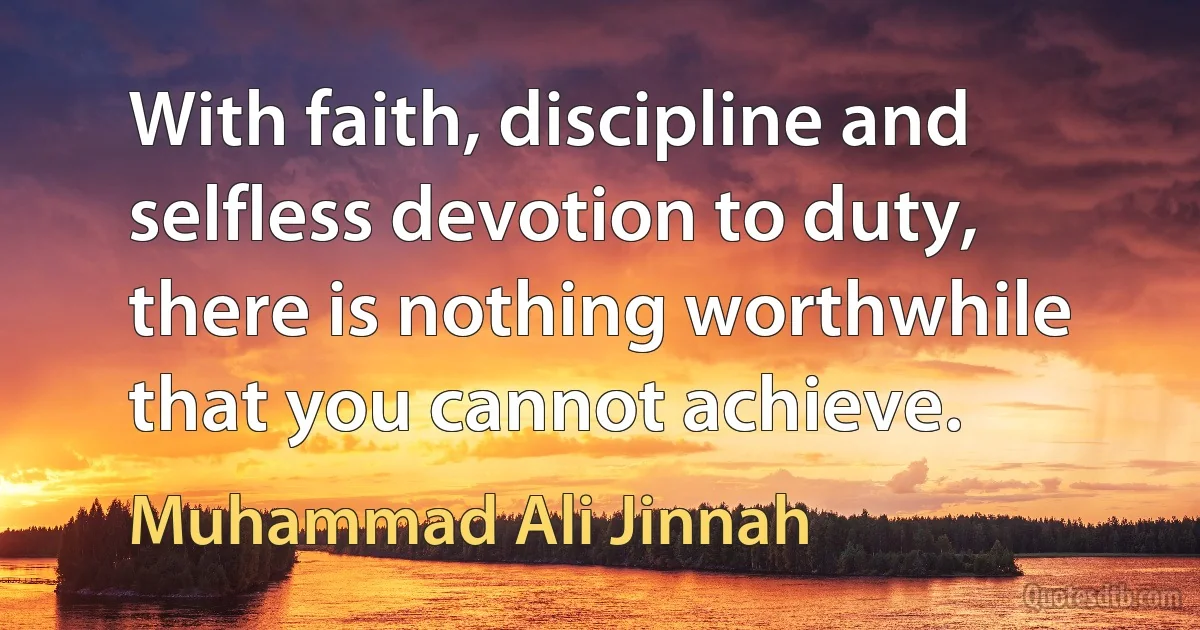Discipline Quotes - page 12
The opinion is widely prevalent that even if the subjects are totally forgotten, a valuable mental discipline is acquired by the efforts made to master them. While the Conference admits that, considered in itself this discipline has a certain value, it feels that such a discipline is greatly inferior to that which may be gained by a different class of exercises, and bears the same relation to a really improving discipline that lifting exercises in an ill-ventilated room bear to games in the open air. The movements of a race horse afford a better model of improving exercise than those of the ox in a tread-mill.

Simon Newcomb
There is no more romantic episode in English history, or in the haphazard building of the Empire, than the story of the "Company of Adventurers of England Trading into Hudson's Bay." To look for the North-west passage while they made profits out of furs, to obtain a charter of sovereignty over the lands which contained all the waters flowing into that bay, and yet to leave those lands unexplored for many, many years- this is a typically British proceeding. They sought the western equivalents of "ivory and apes and peacocks," and they found an empire as a by-product. They created a great tradition, a tradition which is your own to-day, of discipline and endurance round a commercial ideal. They treated the Indians as a source of profit, yet they treated them with justice and with kindliness. They kept one eye on dividends and another on exploration. What race besides our own could be so casual, so far-sighted, so inconsistent and so successful?

Stanley Baldwin
It is a great tribute to the good qualities of the strikers, who are our own people, that they showed that sense of discipline and restraint in obedience to their instructions. Many of them obeyed their orders from their sense of loyalty, orders of which they disapproved themselves, but if that strike had been successful it would have meant industrial ruin, not only to the miners, but to the whole country.

Stanley Baldwin
All life is based on the fact that anything worth getting is hard to get. There is a price to be paid for anything. Scholarship can only be bought at the price of study, skill of craft or technique can only be bought at the price of practice, and eminence in any sport can only be bought at the price of training and discipline.

William Barclay
Even in terms of the beginning stage of the career, obstacles are something that you get so used to. The uncertainty of your life. You'll always exist in a weird balance because you're going for a career that's somewhat unrealistic and not all success. There's always challenges and you've gotta get through it or you're beaten by it. It creates this kind of discipline, in a sense.

John Boyega
.. I have never managed to grasp what exactly 'pataphysics' consisted of; but in short what I have always seen in it is a desire to disconnect philosophy from the discipline of logic, and to admit incoherence as a legitimate component of it. [comment on visiting frequently the Collège de 'Pataphysique'].

Jean Dubuffet
And this [experimental] science verifies all natural and man-made things in particular, and in their appropriate discipline, by the experimental perfection, not by arguments of the still purely speculative sciences, nor through the weak, and imperfect experiences of practical knowledge. And therefore, this is the matron of all preceding sciences, and the final end of all speculation.

Roger Bacon
If circumstances should at any time oblige the government to form an army of any magnitude that army can never be formidable to the liberties of the people while there is a large body of citizens, little, if at all, inferior to them in discipline and the use of arms, who stand ready to defend their own rights and those of their fellow-citizens. This appears to me the only substitute that can be devised for a standing army, and the best possible security against it, if it should exist.

Alexander Hamilton
Throughout theological history we have been assured by religious leaders that if we perform certain rituals, repeat certain prayers or mantras, conform to certain patterns, suppress our desires, control our thoughts, sublimate our passions, limit our appetites and refrain from sexual indulgence, we shall, after sufficient torture of the mind and body, find something beyond this little life. And that is what millions of so-called religious people have done through the ages, either in isolation, going off into the desert or into the mountains or a cave or wandering from village to village with a begging bowl, or, in a group, joining a monastery, forcing their minds to conform to an established pattern. But a tortured mind, a broken mind, a mind which wants to escape from all turmoil, which has denied the outer world and been made dull through discipline and conformity - such a mind, however long it seeks, will find only according to its own distortion.

Jiddu Krishnamurti
These are the duties of the overseer: He should maintain discipline. He should observe the feast days. He should respect the rights of others and steadfastly uphold his own. He should settle all quarrels among the hands; If any one is at fault he should administer the punishment. He should take care that no one on the place is in want, or lacks food or drink; in this respect he can afford to be generous, for he will thus more easily prevent picking and stealing.

Cato the Elder
The last 20 years have· seen an enormous growth of institutions devoted to anthropological enterprises, membership within the discipline, and students, text books, and paraphernalia. From a tiny scholarly group that could easily be fitted into a couple of buses, and most of whom knew each other, we have grown into a group of tremendous, anonymous milling crowds, meeting at large hotels where there are so many sessions that people do well to find those of their colleagues who are interested in the same specialty. Today we look something like the other social science disciplines, suffering some of the same malaise, and becoming cynical about slave markets and worried when grants and jobs seem to be declining.

Margaret Mead
General systems theory, in a sense, is no news at all, as Von Foerster found out when he attempted to organize a conference of general systems people and anthropologists. In a sense, the situation is comparable to that found by the Committee for the Study of Mankind, in which a committee that included Robert Redfidd tried to get each discipline to consider its relationship to the concept of Mankind. Anthropologists replied, "we are related already," and so they were. Something similar may be said of attempts to date in mathematical anthropology. The kind of information that a computer program can finally provide, on a level of a particular culture, is simply a reflection of how detailed field work has been done, and to the careful field worker, on kinship, for example, it provides no illumination.

Margaret Mead
I do not believe that unless you can persuade parents that the family should still remain the unit in which discipline is applied, you will never get a conquest of the crime wave. ... We have created a better and happier state from the material point of view, but, at the same time, there is no doubt that the younger generation, especially just before leaving school, and between the ages of 17 and 19, are much more unruly than is right in a modern, civilized society.

Rab Butler
In general, any methods of discipline applied to the body which tend to modify its desires or repulsions, are good-for ascetic ends. But if done for display, they betray at once a man who keeps an eye on outward show; who has an ulterior purpose, and is looking for spectators to shout, "Oh what a great man!" This is why Apollonius so well said: "If you are bent upon a little private discipline, wait till you are choking with heat one day-then take a mouthful of cold water, and spit it out again, and tell no man!"

Epictetus
How would I have turned out, I sometimes wonder, had I grown up in a house that stifled enterprise by imposing harsh and senseless discipline? Or in an atmosphere of overindulgence, in a household where there were no rules, no boundaries drawn? My mother certainly understood the importance of discipline, but she always explained why some things were not allowed. Above all, she tried to be fair and to be consistent.

Jane Goodall


![On Aka, god is a word without referent. No capital letters. No creator, only creation. No eternal father to reward and punish, justify injustice, ordain cruelty, offer salvation. Eternity not an endpoint but a continuity. Primal division of being into material and spiritual only as two-as-one, or one in two aspects. [...] The Akan system is a spiritual discipline with spiritual goals, but they're exactly the same goals it seeks for bodily and ethical well-being. Right action is its own reward. Dharma without karma. (Ursula K. Le Guin)](https://cdn.quotesdtb.com/img/quotes_images_webp/93/ursula-k-le-guin-445493.webp)
